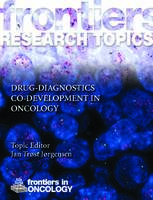Dublin Core
Title
Drug-Diagnostics Co-Development in Oncology
Subject
Drug
Diagnostics Co-Development in Oncology
Description
The idea of combining drugs and diagnostics in oncology is not new. When the selective estrogen-receptor modulator tamoxifen was developed in the 1970s for the treatment of breast cancer, data
on estrogen-receptor status were correlated with the treatment outcome. Based on a phase II study performed in patients with advanced breast cancer, published in 1976, the investigators concluded:“a
high degree of correlation between response and positive estrogen-receptor assay suggests the value of the diagnostic test as a means to select patients for tamoxifen treatment” (1). Despite the fact that this conclusion was drawn nearly 40 years ago, the
adaptation of the drug-diagnostic co-development model has been relatively slowand it is only within the last decade that it has gained widespread acceptance.
on estrogen-receptor status were correlated with the treatment outcome. Based on a phase II study performed in patients with advanced breast cancer, published in 1976, the investigators concluded:“a
high degree of correlation between response and positive estrogen-receptor assay suggests the value of the diagnostic test as a means to select patients for tamoxifen treatment” (1). Despite the fact that this conclusion was drawn nearly 40 years ago, the
adaptation of the drug-diagnostic co-development model has been relatively slowand it is only within the last decade that it has gained widespread acceptance.
Creator
Jan Trost Jorgensen
Source
https://www.frontiersin.org/research-topics/1313/drug-diagnostics-co-development-in-oncology
Publisher
Frontiers Media SA
Date
2014
Contributor
Tatik
Rights
Creative Commons
Format
PDF
Language
English
Type
Textbooks
Identifier
ISSN 1664-8714
ISBN 978-2-88919-332-5
DOI 10.3389/978-2-88919-332-5

